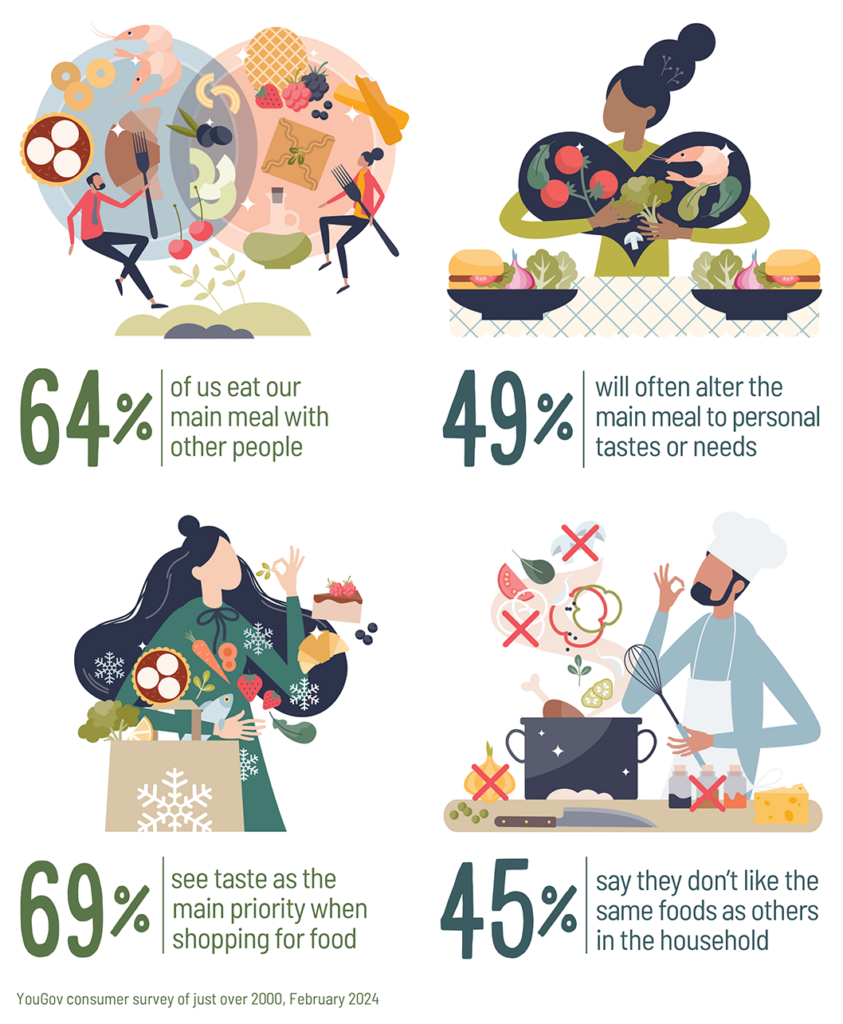It’s official – us Brits are picky…but we do still love to eat together. That’s according to a Fieldfare survey we ran in conjunction with YouGov.
Our research found that the family dinner is alive and well as nearly two-thirds of us (64%) eat our main meal with other people. We also found that almost half (49%) of Brits will often make a few alterations to the meal on offer, to cater for personal tastes or needs. Almost a fifth (17%) said that they often eat entirely different dishes at the table while dining together.

So, why is it that dining together, but (plates) apart, is becoming the new norm?
- 13% of those who eat different or altered dishes cited allergies and intolerances or different diets such as vegan or vegetarian (15%)
- What it really comes down to though is personal choice – with nearly half (45%) saying that they simply don’t like the same things.
- Brought up during the 90s rise of the celebrity chef and aspirational Michelin-starred restaurants, households with people aged 35 – 44 years old (Millennials) seem to be the most particular, with 55% of this group saying they like different things from the rest of their household.
- For Gen Z on the other hand, it’s all about asserting their right to make their own decisions, with 37% of 18 – 24-year-olds surveyed stating that they want a choice and do not want to be forced to have what everyone else is eating.
This celebration of individual choice also seems to play a large part when shopping for food and planning meals, no doubt contributing to the shift in how Brits are shopping for food now versus just a few years ago:
- Taste is king, with more than two-thirds (69%) of UK Adults stating that taste is their top priority when choosing what goes in their basket and ultimately onto their plate
- Half (51%) will seek out products that they consider to be high quality
- More than a third (38%) felt that having the freedom to choose the right amount or portion of food, rather than pre-packed amounts, is a priority for them
- A quarter (25%) prefer to support small or local businesses over big brands and large nationwide stores, and nearly a third (32%) said that choosing British brands is important to them
- 35% have bought “posh” or premium frozen foods from farm shops or food halls in the past
“It’s encouraging that around two-thirds of people do find time to enjoy their main meal together but priorities and lifestyles continue to evolve and so will our mealtimes. A few years ago, we may have said that tweaking dishes to everyone’s taste or needs, or even having to prepare different dishes for the same dinner table would be very frustrating for whomever is doing the cooking. However, the availability of better quality prepared foods and increased popularity of loose or portioned foods, especially the rise of premium frozen foods, has made it easier to please everyone”, says Matt Whelan MD of Fieldfare.
The report by YouGov, on our behalf also found that over a third (35%) of UK adults eat alone, and 56% of 18 – 24-year-olds eat their main meal on their own. 37% state that they eat together as couples.
“With one in three (32%) UK households being single-person households and both parents in full-time employment in over 50% of British families , it’s time that we start thinking about household mealtimes differently and that is why we champion choice with high-quality loose frozen foods that people can pick as much as they want or as little as they need,” Matt continues.
So, whether you see it as fussiness, or the right to have a choice, the UK family dinner is alive and well, just not as you might know it.
Want to read a copy of our full report? Drop us an email.


